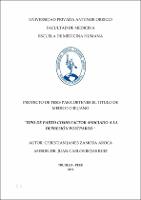Mostrar el registro sencillo del ítem
Tipo de parto como factor asociado a la depresión postparto
| dc.contributor.advisor | Rojas Ruíz, Juan Carlos | |
| dc.contributor.author | Zamora Aroca, Christian James | |
| dc.creator | Zamora Aroca, Christian James | |
| dc.date.accessioned | 2019-07-23T15:04:35Z | |
| dc.date.available | 2019-07-23T15:04:35Z | |
| dc.date.issued | 2019 | |
| dc.identifier.uri | https://hdl.handle.net/20.500.12759/5187 | |
| dc.description.abstract | OBJETIVO: Evaluar si el tipo de parto es un factor asociado a depresión postparto. MATERIAL Y MÉTODOS: Se realizó un estudio de tipo cohorte, en el cual participaron 192 mujeres, de las cuales 64 tuvieron parto por cesárea y 128 parto vaginal, que cumplieron los criterios de selección y asistieron a los consultorios externos de obstetricia y/o neonatología del Hospital Regional Docente de Trujillo durante el periodo enero-mayo del 2019. Se evaluó la proporción de Depresión postparto, a través de la aplicación de la Escala de Depresión Postparto de Edinburgh (EPDS). Se usó la prueba estadística Chi cuadrado de Pearson, asimismo se calculó la razón de prevalencias. RESULTADOS: En la evaluación del tipo de parto en pacientes con depresión postparto (DPP) se halló que la frecuencia de las pacientes con cesárea fue 28.1% y de las, por parto vaginal 14,1%, siendo dicha diferencia estadísticamente significativa. Por lo tanto, el parto por cesárea es un factor de riesgo para la depresión postparto. En cuanto a las covariables, el número de hijos y el sexo del hijo se obtuvieron diferencias no significativas. Mientras que para el grado de instrucción se tiene que la frecuencia de las puérperas con DPP y primaria es 34,5%, secundaria 10,3% y superior de 22,4%, y respecto a la actividad laboral podemos ver que la frecuencia de las pacientes con DPP que no la realizan es de 28.3% frente al 0% de las que sí realizan alguna actividad laboral, siendo las diferencias de estas dos últimas variables estadísticamente significativa. CONCLUSIÓN: El tipo de parto es un factor asociado a la depresión postparto. | es_PE |
| dc.description.abstract | OBJECTIVE: To assess if type of delivery is a factor associated for postpartum depression. MATERIAL AND METHODS: A cohort study was carried out, in which 192 women participated, of whom 64 had a cesarean delivery and 128 vaginal delivery, who met the selection criteria and attended the outpatient obstetrics and / or neonatology offices of the Regional Teaching Hospital of Trujillo during the period January-May of 2019. The proportion of Postpartum Depression was evaluated through the application of the Edinburgh Postpartum Depression Scale (EPDS). The Pearson Chi square test was used, and the prevalence ratio was calculated. RESULTS: In the evaluation of the type of delivery in patients with postpartum depression (PPD) it was found that the frequency of the patients with caesarean section was 28.1% and of those, by vaginal delivery 14.1%, this difference being statistically significant. Therefore, cesarean delivery is a risk factor for postpartum depression.Regarding the covariates, the number of children and the sex of the child, non-significant differences were obtained. While for the level of education the frequency of the puerperal women with PPD and primary education is 34.5%, secondary 10.3% and higher than 22.4%, and with respect to work activity we can see that the frequency of the patients with DPP who do not perform it are of 28.3% compared to 0% of those who do some work activity, being the differences of these last two variables statistically significant. CONCLUSION: Type of delivery is a factor associated for postpartum depression. | en_US |
| dc.description.uri | Tesis | es_PE |
| dc.format | application/pdf | es_PE |
| dc.language.iso | spa | es_PE |
| dc.publisher | Universidad Privada Antenor Orrego - UPAO | es_PE |
| dc.relation.ispartofseries | T_MED.HUMA_2603 | |
| dc.rights | info:eu-repo/semantics/openAccess | es_PE |
| dc.source | Universidad Privada Antenor Orrego | es_PE |
| dc.source | Repositorio Institucional - UPAO | es_PE |
| dc.subject | Tipo de parto | es_PE |
| dc.subject | Cesárea | es_PE |
| dc.subject | Parto vaginal | es_PE |
| dc.subject | Depresión postparto | es_PE |
| dc.title | Tipo de parto como factor asociado a la depresión postparto | es_PE |
| dc.type | info:eu-repo/semantics/bachelorThesis | es_PE |
| thesis.degree.level | Título Profesional | es_PE |
| thesis.degree.grantor | Universidad Privada Antenor Orrego. Facultad de Medicina Humana | es_PE |
| thesis.degree.name | Médico Cirujano | es_PE |
| thesis.degree.discipline | Medicina Humana | es_PE |
Ficheros en el ítem
Este ítem aparece en la(s) siguiente(s) colección(es)
-
Medicina Humana [2762]

